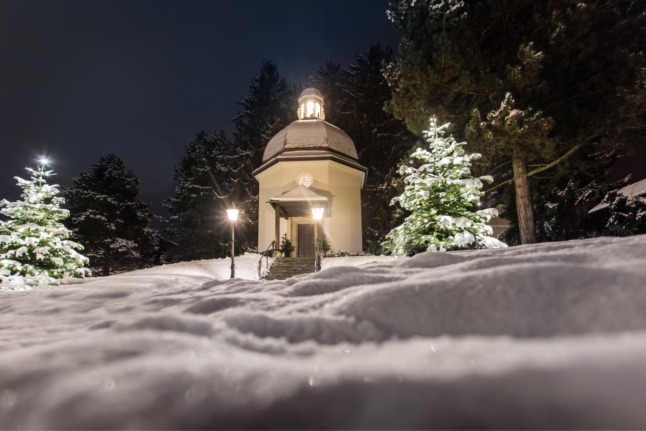Five Christmas songs to improve your German language skills

Want to feel more festive while also improving your German? Writer Sarah Magill digs out some of the most beautiful (and fun) German-language Christmas carols.
German Christmas songs (Weihnachtslieder) have a very long tradition – with some of the songs sung today having their origins in the Middle Ages.
Like their English language counterparts, there are a few traditional German Christmas songs which can be heard everywhere during the festive season and which are sung every year, without fail on Heiligabend (Christmas Eve).
Here are five of the nation’s favourite Christmas songs, which will not only get you in a christmassy mood, but will also broaden your German vocabulary.
READ ALSO: Seven classic German Christmas traditions still taking place in the pandemic
1. Stille Nacht
You may be familiar with the English adaptation of this carol - “Silent Night” - but the original version comes from the city of Oberndorf bei Salzburg in Austria.
On December 24th, 1818, the assistant priest of the church of St. Nicola, Josef Mohr, presented the organist Franz Gruber with a poem called Stille Nacht! Heilige Nacht! ("Silent Night! Holy Night!") and the two sang the song for the first time at the Christmas mass.

The Silent Night chapel in Oberndorf near Salzburg. Photo:picture alliance / Eva-Maria Repolusk/SalzburgerLand Tourismus/dpa-tmn | Eva-Maria Repolusk
Written just after the Napoleonic wars, the text of Stille Nacht uses imagery of peace and calm, and has played an important role in times of war throughout its 200-year history: it was sung and performed in public during the First World War and also during the Second World War.
German version
Stille Nacht, heilige Nacht!
Alles schläft, einsam wacht
Nur das traute, hochheilige Paar.
Holder Knabe im lockigen Haar,
Schlaf in himmlischer Ruh,
Schlaf in himmlischer Ruh.
English version
Silent night, holy night!
All sleeps, lonely wakes
Only the happy, sacred couple.
Sweet boy with curly hair,
Sleep in heavenly peace,
Sleep in heavenly peace.
The song has since been translated into more than 300 languages and dialects around the globe.
2. O Tannenbaum
Another German language original which has found its way into the English canon of Christmas carols, O Tannenbaum (“Oh Christmas Tree”) was originally a sad love song. The text was written by Potsdam scholar August Zarnack in 1820 to an already existing melody ("Long live the journeyman carpenter") and is written from the perspective of a betrayed lover who is praising the constancy of the conifer tree:
German version
O Tannenbaum, o Tannenbaum,
wie grün sind deine Blätter!
O Tannenbaum, o Tannenbaum,
wie grün sind deine Blätter!
Du grünst nicht nur zur Sommerszeit,
nein, auch im Winter, wenn es schneit.
O Tannenbaum, o Tannenbaum,
wie grün sind deine Blätter!
English version
O Christmas Tree, O Christmas Tree
How green are your branches!
O Christmas Tree, O Christmas Tree
How green are your branches!
You're not just green in summertime,
No, also in winter when it snows,
O Christmas Tree, O Christmas Tree
How green are your branches!
Four years later, Ernst Anschütz took the successful song and, retaining the first verse, turned it into a cheerful Christmas carol for children, which has grown in popularity ever since.

Sunlit conifers on the slopes of the Black Forest. Photo: picture alliance/dpa | Philipp von Ditfurth
3. O du fröhliche
O du fröhliche (“Oh you joyful”) is one of the best-known German-language Christmas carols. Its melody is based on the Sicilian Marian carol O sanctissima and the text of the first of three stanzas was written by the Weimar "orphan father" Johannes Daniel Falk.
Another text composed just after the Napoleonic wars, this song was written by Johannes Daniel Falk for the war orphans who were in the care of him and his wife Caroline. Around 1815, he wrote a song for these children: o du fröhliche and, to this day, many people all over the world sing it, especially on Christmas Eve.
German version
O du fröhliche, o du selige,
Gnadenbringende Weihnachtszeit!
Welt ging verloren,
Christ ist geboren:
Freue, freue dich, o Christenheit!
English version
O merry, O blessed,
Merry Christmas time!
The world was lost,
Christ is born:
Rejoice, rejoice, O Christendom!
READ ALSO: Ten ways to celebrate Christmas like a German
4. Leise rieselt der Schnee
The Christmas song Leise rieselt der Schnee (“Quietly trickles the snow”) is traditionally sung throughout Advent in Germany. It was written and composed by the Protestant pastor Eduard Ebel in 1895 and is now one of the nation’s most popular Christmas songs.
The text is is packed with beautiful imagery of a snowy landscape:
German version
Leise rieselt der Schnee
Still und starr ruht der See
Weihnachtlich glänzet der Wald
Freue Dich, Christkind kommt bald
English version
Quietly trickles the snow
Still and rigid rests the lake
Christmas shines in the forest
Rejoice, Christ Child is coming soon
5. In der Weihnachtbäckerei
A much more modern Christmas song, in der Weihnachtsbäckerei (“in the Christmas bakery”) describes what’s going on behind the scenes in preparation of German sweet seasonal treats.
It’s a great song for practising your culinary skills, as it reads like a recipe for making Plätzchen (traditional German Christmas cookies).

A child cuts out cookies in Hamburg, 2018. Photo: picture alliance/dpa | Axel Heimken
The song’s composer and writer, Rolf Zuckowski, made up the song in 1986 while driving home to his family who were making Christmas cookies. When he arrived home, the song was ready and his three-year-old son immediately sang the new song on his way to bed.
German version
In der Weihnachtsbäckerei
Gibt es manche Leckerei
Zwischen Mehl und Milch
Macht so mancher Knilch
Eine riesengroße Kleckerei
In der Weihnachtsbäckerei
In der Weihnachtsbäckerei
Brauchen wir nicht Schokolade
Zucker, Nüsse und Succade
Und ein bisschen Zimt?
Das stimmt
Butter, Mehl und Milch verrühren
Zwischendurch einmal probieren
Und dann kommt das Ei (pass auf)
Vorbei
English version
In the Christmas bakery
There are many treats
Between flour and milk
Many a lout makes
A huge mess
In the Christmas bakery
In the Christmas bakery
Don't we need chocolate
Sugar, nuts and succade
And a little bit of cinnamon?
That's right
Mix butter, flour and milk
Taste in between
And then comes the egg (watch out)
Too late!
READ ALSO: German Advent word of the day: Die Plätzchen
Comments (1)
See Also
German Christmas songs (Weihnachtslieder) have a very long tradition – with some of the songs sung today having their origins in the Middle Ages.
Like their English language counterparts, there are a few traditional German Christmas songs which can be heard everywhere during the festive season and which are sung every year, without fail on Heiligabend (Christmas Eve).
Here are five of the nation’s favourite Christmas songs, which will not only get you in a christmassy mood, but will also broaden your German vocabulary.
READ ALSO: Seven classic German Christmas traditions still taking place in the pandemic
1. Stille Nacht
You may be familiar with the English adaptation of this carol - “Silent Night” - but the original version comes from the city of Oberndorf bei Salzburg in Austria.
On December 24th, 1818, the assistant priest of the church of St. Nicola, Josef Mohr, presented the organist Franz Gruber with a poem called Stille Nacht! Heilige Nacht! ("Silent Night! Holy Night!") and the two sang the song for the first time at the Christmas mass.

The Silent Night chapel in Oberndorf near Salzburg. Photo:picture alliance / Eva-Maria Repolusk/SalzburgerLand Tourismus/dpa-tmn | Eva-Maria Repolusk
Written just after the Napoleonic wars, the text of Stille Nacht uses imagery of peace and calm, and has played an important role in times of war throughout its 200-year history: it was sung and performed in public during the First World War and also during the Second World War.
German version
Stille Nacht, heilige Nacht!
Alles schläft, einsam wacht
Nur das traute, hochheilige Paar.
Holder Knabe im lockigen Haar,
Schlaf in himmlischer Ruh,
Schlaf in himmlischer Ruh.
English version
Silent night, holy night!
All sleeps, lonely wakes
Only the happy, sacred couple.
Sweet boy with curly hair,
Sleep in heavenly peace,
Sleep in heavenly peace.
The song has since been translated into more than 300 languages and dialects around the globe.
2. O Tannenbaum
Another German language original which has found its way into the English canon of Christmas carols, O Tannenbaum (“Oh Christmas Tree”) was originally a sad love song. The text was written by Potsdam scholar August Zarnack in 1820 to an already existing melody ("Long live the journeyman carpenter") and is written from the perspective of a betrayed lover who is praising the constancy of the conifer tree:
German version
O Tannenbaum, o Tannenbaum,
wie grün sind deine Blätter!
O Tannenbaum, o Tannenbaum,
wie grün sind deine Blätter!
Du grünst nicht nur zur Sommerszeit,
nein, auch im Winter, wenn es schneit.
O Tannenbaum, o Tannenbaum,
wie grün sind deine Blätter!
English version
O Christmas Tree, O Christmas Tree
How green are your branches!
O Christmas Tree, O Christmas Tree
How green are your branches!
You're not just green in summertime,
No, also in winter when it snows,
O Christmas Tree, O Christmas Tree
How green are your branches!
Four years later, Ernst Anschütz took the successful song and, retaining the first verse, turned it into a cheerful Christmas carol for children, which has grown in popularity ever since.

Sunlit conifers on the slopes of the Black Forest. Photo: picture alliance/dpa | Philipp von Ditfurth
3. O du fröhliche
O du fröhliche (“Oh you joyful”) is one of the best-known German-language Christmas carols. Its melody is based on the Sicilian Marian carol O sanctissima and the text of the first of three stanzas was written by the Weimar "orphan father" Johannes Daniel Falk.
Another text composed just after the Napoleonic wars, this song was written by Johannes Daniel Falk for the war orphans who were in the care of him and his wife Caroline. Around 1815, he wrote a song for these children: o du fröhliche and, to this day, many people all over the world sing it, especially on Christmas Eve.
German version
O du fröhliche, o du selige,
Gnadenbringende Weihnachtszeit!
Welt ging verloren,
Christ ist geboren:
Freue, freue dich, o Christenheit!
English version
O merry, O blessed,
Merry Christmas time!
The world was lost,
Christ is born:
Rejoice, rejoice, O Christendom!
READ ALSO: Ten ways to celebrate Christmas like a German
4. Leise rieselt der Schnee
The Christmas song Leise rieselt der Schnee (“Quietly trickles the snow”) is traditionally sung throughout Advent in Germany. It was written and composed by the Protestant pastor Eduard Ebel in 1895 and is now one of the nation’s most popular Christmas songs.
The text is is packed with beautiful imagery of a snowy landscape:
German version
Leise rieselt der Schnee
Still und starr ruht der See
Weihnachtlich glänzet der Wald
Freue Dich, Christkind kommt bald
English version
Quietly trickles the snow
Still and rigid rests the lake
Christmas shines in the forest
Rejoice, Christ Child is coming soon
5. In der Weihnachtbäckerei
A much more modern Christmas song, in der Weihnachtsbäckerei (“in the Christmas bakery”) describes what’s going on behind the scenes in preparation of German sweet seasonal treats.
It’s a great song for practising your culinary skills, as it reads like a recipe for making Plätzchen (traditional German Christmas cookies).

A child cuts out cookies in Hamburg, 2018. Photo: picture alliance/dpa | Axel Heimken
The song’s composer and writer, Rolf Zuckowski, made up the song in 1986 while driving home to his family who were making Christmas cookies. When he arrived home, the song was ready and his three-year-old son immediately sang the new song on his way to bed.
German version
In der Weihnachtsbäckerei
Gibt es manche Leckerei
Zwischen Mehl und Milch
Macht so mancher Knilch
Eine riesengroße Kleckerei
In der Weihnachtsbäckerei
In der Weihnachtsbäckerei
Brauchen wir nicht Schokolade
Zucker, Nüsse und Succade
Und ein bisschen Zimt?
Das stimmt
Butter, Mehl und Milch verrühren
Zwischendurch einmal probieren
Und dann kommt das Ei (pass auf)
Vorbei
English version
In the Christmas bakery
There are many treats
Between flour and milk
Many a lout makes
A huge mess
In the Christmas bakery
In the Christmas bakery
Don't we need chocolate
Sugar, nuts and succade
And a little bit of cinnamon?
That's right
Mix butter, flour and milk
Taste in between
And then comes the egg (watch out)
Too late!
READ ALSO: German Advent word of the day: Die Plätzchen
Join the conversation in our comments section below. Share your own views and experience and if you have a question or suggestion for our journalists then email us at [email protected].
Please keep comments civil, constructive and on topic – and make sure to read our terms of use before getting involved.
Please log in here to leave a comment.